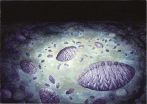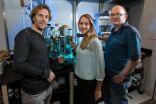(Press-News.org) The field of medical genetics is swiftly evolving. It's a period of rapid scientific discovery, new technologies and subsequent translation into medical practice, public policy and public health. But what role should the Medical Genetics specialist have since genetics impacts all patients and specialties in some way? In an effort to clearly define the changing role of the specialty of Medical Genetics and the distinction between Medical Geneticists and other genetics healthcare professionals, the American College of Medical Genetics and Genomics (ACMG) has has just released a new "Scope of Practice of the Specialty of Medical Genetics" document, revising its earlier 2008 Policy Statement. The ACMG is the specialty society for the American Board of Medical Genetics and Genomics diplomates and others, providing leadership and resources to facilitate the delivery of clinical and laboratory medical genetics services.
ACMG President Gerald Feldman, MD, PhD, FACMG said, "We wanted to clearly define the value that board-certified Clinical Geneticists and Clinical Laboratory Geneticists provide, from their roles performing genetic testing interpretation in the diagnostic laboratory to the medical genetics consultation. The ACMG Scope of Practice document also establishes how our specialty interacts with other members of the medical genetics healthcare team and where we find common ground with other medical specialists."
Feldman explained the genesis of the new document, "The ACMG Board of Directors felt that it was critical to revise the original 2008 document to answer the who, what, where, when, why and how in the current era of genomic medicine, which involves other genetics health professionals, such as genetic counselors, genetic nurses, and other lab professionals performing genetic and genomic testing."
The Scope of Practice document is available at
https://www.acmg.net/docs/ACMG_SOP_GIM_AOP_072315.pdf. A Commentary from Dr. Feldman about the Revised Scope of Practice and new ACMG Strategic Plan is also available at https://www.acmg.net/docs/AOP_Feldman_Commentary_GIM.pdf.
The "ACMG Scope of Practice of the Specialty of Medical Genetics" Policy Statement states that the specialty includes:
Genetic consultations, in both inpatient and outpatient settings
Genetic counseling
Treatment of genetic diseases, involvement in clinical trials and natural history studies leading to approval and use of new, orphan and other drugs
Early detection and prevention of genetic diseases or their complications
Performing genetic and genomic testing, interpreting such results and providing these results to physicians to facilitate diagnosis, management and treatment
Activities outside of direct patient care, including public health administration, health professional education and research.
"The delivery of genetic and genomic healthcare is often complex and requires the combined knowledge of various specialists, " said Michael S. Watson, PhD, FACMG, executive director of the American College of Medical Genetics and Genomics. "This ACMG Scope of Practice document clearly defines the role of the Medical Geneticist and their broad and critical role in direct patient care, genetic counseling, education and laboratory medicine. This document also clearly lays out the value of a genetics consultation by a board-certified clinical geneticist and the importance of board-certified laboratory geneticists in the interpretation of biochemical, cytogenetics and molecular test results. As the field of genetics and genomics continues to evolve and new technologies and treatments become available, the ACMG and our members will continue to play a critical role in meeting the needs of patients and in advancing public health."
INFORMATION:
About the American College of Medical Genetics and Genomics (ACMG)
Founded in 1991, ACMG is the only nationally recognized medical society dedicated to improving health through the clinical practice of medical genetics and genomics. The American College of Medical Genetics and Genomics provides education, resources and a voice for nearly 1800 biochemical, clinical, cytogenetic, medical and molecular geneticists, genetic counselors and other healthcare professionals, nearly 80% of whom are board certified in the medical genetics specialties. The College's mission is to develop and sustain genetic initiatives in clinical and laboratory practice, education and advocacy. Three guiding pillars underpin ACMG's work: 1) Clinical and Laboratory Practice: Establish the paradigm of genomic medicine by issuing statements and evidence-based or expert clinical and laboratory practice guidelines and through descriptions of best practices for the delivery of genomic medicine. 2) Education: Provide education and tools for medical geneticists, other health professionals and the public and grow the genetics workforce. 3) Advocacy: Work with policymakers and payers to support the responsible application of genomics in medical practice. Genetics in Medicine, published monthly, is the official ACMG peer-reviewed journal. ACMG's website offers a variety of resources including Policy Statements, Practice Guidelines, Educational Resources, and a Find a Geneticist tool. The educational and public health programs of the American College of Medical Genetics are dependent upon charitable gifts from corporations, foundations, and individuals through the ACMG Foundation for Genetic and Genomic Medicine.
Various sight recovery therapies are being developed by companies around the world, offering new hope for people who are blind. But little is known about what the world will look like to patients who undergo those procedures.
A new University of Washington study seeks to answer that question and offers visual simulations of what someone with restored vision might see. The study concludes that while important advancements have been made in the field, the vision provided by sight recovery technologies may be very different from what scientists and patients had previously ...
Recent research has shown that the more time employees spend in their chairs, the more likely they are to develop serious health problems such as diabetes, heart disease, and obesity. The July special issue of Ergonomics in Design examines the health and safety effects of the sedentary workplace, the pros and cons of alternatives to sitting at work (for example, sit-stand and treadmill workstations, ball chairs), and proposed workplace design solutions. The full text of the issue, guest edited by Jack Dennerlein, is now available online and may be found at http://erg.sagepub.com/content/current.
"With ...
Scientists from the University of Leeds have uncovered further evidence that the protective buffers at the ends of chromosomes - known as telomeres - are fundamental to the understanding of the deadliest form of skin cancer, melanoma.
A team of international researchers, co-led by Dr Mark Iles from the University's School of Medicine and St James's University Hospital in Leeds, has uncovered five new common genetic risk factors for melanoma. They have also confirmed two others previously suspected to be risk factors.
Dr Iles said: "This research establishes further ...
Researchers led by the University of Cambridge have found the earliest example of reproduction in a complex organism. Their new study has found that some organisms known as rangeomorphs, which lived 565 million years ago, reproduced by taking a joint approach: they first sent out an 'advance party' to settle in a new area, followed by rapid colonisation of the new neighbourhood. The results, reported today in the journal Nature, could aid in revealing the origins of our modern marine environment.
Using statistical techniques to assess the distribution of populations ...
High-dose vitamin D supplementation in postmenopausal women was not associated with beneficial effects on bone mineral density, muscle function, muscle mass or falls, according to the results of a randomized clinical trial published online by JAMA Internal Medicine.
Low levels of vitamin D contribute to osteoporosis because of decreased total fractional calcium absorption (TFCA) and nearly half of postmenopausal women sustain an osteoporotic fracture. However, experts disagree on the optimal vitamin D level for skeletal health. Some experts contend that optimal serum ...
A recently discovered family of small RNA molecules, some of which have been implicated in cancer progression, has just gotten much larger thanks to a new RNA sequencing technique developed by researchers at UC Santa Cruz.
The technique, described in a paper published August 3 in Nature Methods, provides sensitive detection of small RNAs that are chemically modified (methylated) after being transcribed from the genome. The researchers used the technique to reveal an abundance of modified fragments derived from transfer RNA molecules in both yeast cells and human cells.
"Transfer ...
Skeletal muscle is one of the most abundant tissue types in the human body, but has proven difficult to produce in large quantities in the lab. Unlike other cell types, such as heart cells, neurons and cells found in the gut, previous attempts to efficiently and accurately derive muscle cells from pre-cursor cells or culture have not been fruitful. In a new study published this week in Nature Biotechnology, investigators from Brigham and Women's Hospital (BWH) report that by identifying and mimicking important developmental cues, they have been able to drive cells to grow ...
LA JOLLA--T cells are the guardians of our bodies: they constantly search for harmful invaders and diseased cells, ready to swarm and kill off any threats. A better understanding of these watchful sentries could allow scientists to boost the immune response against evasive dangers (e.g., cancer or infections), or to silence it when it mistakenly attacks the body itself (e.g., autoimmune disorders or allergies).
Now, scientists at the Salk Institute have discovered that T cell triggering relies on a dynamic protein network at the cell surface, as reported in August 3, ...
New brain research has mapped a key trouble spot likely to contribute to intellectual disability in Down syndrome. In a paper published in Nature Neuroscience [3 Aug], scientists from the University of Bristol and UCL suggest the findings could be used to inform future therapies which normalise the function of disrupted brain networks in the condition.
Down syndrome is the most common genetic cause of intellectual disability, and is triggered by an extra copy of chromosome 21. These findings shed new light on precisely which part of the brain's vast neural network contribute ...
Greenhouse-gas emissions from human activities do not only cause rapid warming of the seas, but also ocean acidification at an unprecedented rate. Artificial carbon dioxide removal (CDR) from the atmosphere has been proposed to reduce both risks to marine life. A new study based on computer calculations now shows that this strategy would not work if applied too late. CDR cannot compensate for soaring business-as-usual emissions throughout the century and beyond, even if the atmospheric carbon dioxide (CO2) concentration would be restored to pre-industrial levels at some ...


